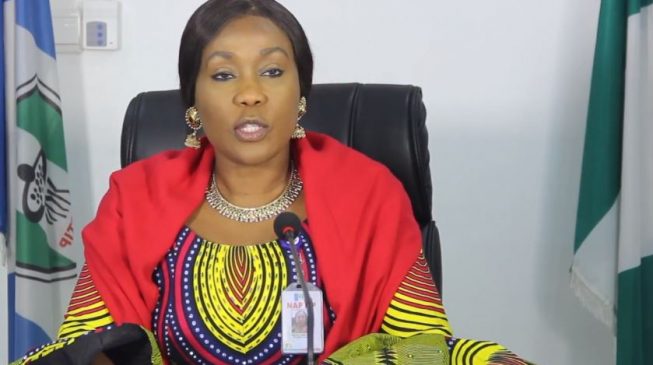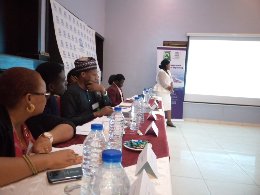A weekly podcast on irregular migration commences today on FRONT PAGE following a two-day workshop organised by the Wole Soyinka Centre For Investigative Journalism and UNESCO. The two nonprofits had September 5th and 6th, 2019 trained 22 journalists on how to better inform the public about irregular migration through human angle stories.
Titled ‘Migration Tori’, the podcast presented in pidgin English is birthed by Ms. Tobore Ovuorie, a multiple award-winning investigative journalist who was among the 22 journalists trained.
Ms. Ovuorie says ‘Migration Tori’ is her contribution to the conversation which began during the two-day masterclass on migration. According to her, the conversation has to continue in diverse ways, podcasting inclusive.
‘Migration Tori’ will bring to the fore migration related issues, while creating awareness on the various ways Nigerians can migrate legally and educating the public on the various laws that could be explored for protecting themselves when outside the country.
In this week’s edition, Ms. Ovuorie who is also the presenter of the podcast shares some of the nonfiction stories about how unsuspecting families were deceived by human traffickers and their children sold into slavery. These, Ms. Ovuorie says were discussed at the training.
She narrates the story about Adesuwa a 16 year old brilliant secondary school leaving certificate holder whose parents could not afford her university education, thus, sought the assistance of Madam Do Good, an international business woman who doubles as a philanthropist.
Dr. Franca Attoh, associate professor, sociology department, University of Lagos, who told the story at the workshop said only the names of the persons were changed for their privacy.
Examples of how other families lost their children to traffickers and smugglers were also discussed at the workshop, and on ‘Migration Tori’.
National Agency for the Prohibition of Trafficking In Persons (NAPTIP) says in Nigeria, the two most reported human trafficking cases are foreign travels which promote prostitution and employment of children as domestic workers and inflicting grievous harm. Most of these victims are women but children and men these days, now consist larger shares than they did 10 years ago. The anti-trafficking agency’s 2017 report states in the country, 0.1 percent of trafficked victims are men while 25 percent are females.
Globally, 51 percent of trafficked persons are females and 21 percent are males. Traffickers, the report indicates are often males but women comprise a large number of convicted offenders.
NAPTIP, in an earlier report, states in 2014, children comprised 28 percent of detected victims, and men, 21 percent. Thus, 51 percent were women. It indicates about four in 10 victims detected between 2012 and 2014 were trafficked for forced labour, and out of these victims, 63 percent were men.
The United Nations Office on Drugs and Crime (UNODC) in her 2016 Global Report On Trafficking In Persons says globally, more than 500 different trafficking flows were detected between 2012 and 2014. Forty-two percent of detected victims between 2012 and 2014 were trafficked domestically, while 21,251 total victims were detected.
The UNODC reports 69 countries reported to have detected 21,251 victims from Sub-Saharan Africa between 2012 and 2014. Nigeria had 1030 detected trafficking victims. Of these, 322 were adults (61 males, 261 females) and 708 were children (458 boys, 250 girls).
Like NAPTIP, the UNODC also indicates while traffickers are overwhelmingly male, women comprise a relatively large share of convicted offenders, compared to most other crimes. This share, according to the UN organization, is even higher among traffickers convicted in the victims’ home country. Court cases and other qualitative data indicate that women are often used to recruit other women. It disclosed trafficking in persons recorded 400 offenses in 2012, 407 in 2013, 603 in 2014 and 334 in 2015. However, in 2012, it disclosed 185 males and 147 females suspects and arrests were made.
Barrister Julie Okah-Donli, Director General, NAPTIP, on ‘Migration Tori’ warns parents about the dangers of giving their kids to other persons as domestic assistants. She says the children could end up in the hands of human traffickers, noting that traffickers are ruthless persons.
The NAPTIP helmswoman advises Nigerians that the grass on the other side though seems greener is never so in actuality.















